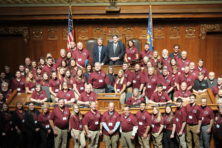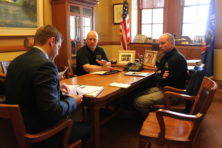Legislative Notes
- Share
- Tweet
- Pin
- Share
Bipartisan Bill Would Improve Response To Harmful Algal Blooms
Last week, U.S. Sens. Tammy Baldwin (D-Wisconsin) and Dan Sullivan (R-Alabama) introduced the Harmful Algal Bloom and Hypoxia Research and Control Amendments Act (HABHRCA) of 2023, a bipartisan bill to improve response to harmful algal blooms that have the potential to threaten aquatic ecosystems, hurt local economies, and endanger public health. The legislation would reauthorize the HABHRCA of 1998 and improve monitoring, forecasting, prevention, and mitigation of harmful algal blooms (HABs) and hypoxia by requiring better coordination among task force agencies, and state and local entities, including Indian tribes.
HABS have long been an issue across the Badger State, often caused by an overabundance of nutrients from fertilizer and stormwater runoff, but Baldwin said climate change is contributing to the acceleration of algae growth in Wisconsin and across the country. Warming waters and strong storms have created ideal conditions for toxic algal blooms as far north as Lake Superior, threatening outdoor recreation and hurting local economies, she said. Additionally, HABs can reduce oxygen levels in the water in events called “hypoxia”, harming coastal ecosystems and posing health risks for coastal communities. HABs occur in all 50 states, in rivers, lakes, and coastal waters.
The full text of this legislation is available at sullivan.senate.gov/imo/media/doc/bill_112723.pdf.
Vegetable Garden Protection Act Clears Committee
A bipartisan bill protecting the right of Wisconsin homeowners to grow their own food on their own property, free from unreasonable restrictions, passed a State Assembly committee, Nov. 16.
State Sen. André Jacque (R-De Pere) and State Rep. Shae Sortwell (R-Gibson) said they introduced the bipartisan Wisconsin Vegetable Garden Protection Act – Assembly Bill 379 – at the request of constituents across their districts after becoming aware that local zoning ordinances have explicitly banned home vegetable gardens.
They said the proposal strikes a balance between private property rights, localized “grow your own” food supplies, concern for pollinators and legitimate community standards and public safety.
Jacque and Sortwell said the Two Rivers City Council recently extended its pilot program for front-yard vegetable gardens into the 2024 growing season, in part due to this legislation. Illinois and Florida have enacted similar laws protecting a citizen’s right to grow their own food on their own property.
The Wisconsin Vegetable Garden Protection Act went to the Assembly Floor following the committee action and must pass the Senate and be signed by the Governor to become law.
First Come, First Camp Legislation
Rep. Joel Kitchens (R-Sturgeon Bay) introduced legislation this week that would give Wisconsin residents the first chance on the best camping spots in the state.
Under current law, the online state park camping reservation window opens at the same time for Wisconsin residents and non-residents.
“The current system creates an environment where Wisconsin residents are losing out on their favorite campsites to non-residents because their internet wasn’t fast enough or they didn’t click on the campsite soon enough,” Kitchens said in his December email update.
The bill would give Wisconsin residents 14 days to reserve state park campsites prior to non-residents at Wisconsin’s most popular state parks, where camping occupancy rates are more than 90%: Peninsula State Park, Devil’s Lake State Park and Kohler-Andrae State Park. At all other state parks, the current reservation rules would still apply.
Residents would pay the non-resident camping fee for the early-window chance, generally $10-$15 more per night. on any reservation made during the early window.
Kitchens said the legislation follows the lead of Wyoming and Florida, where early opportunities to reserve state park campsites exist.
Bill Supports Opportunities For ‘dreamers’
A group of Republican and Democratic lawmakers introduced a handful of legislation this week that would make it easier for people living in Wisconsin through the Deferred Action for Childhood Arrivals (DACA) program to work and learn in the state.
The Wisconsin State Journal reported that DACA people – undocumented immigrants whose parents brought them to the United States as children, also known as “Dreamers” – would be able to receive tax credits, in-state tuition and access to professional licenses under the bipartisan package unveiled Dec. 4.
Proponents of the three bills, include Rep. Joel Kitchens (R-Sturgeon Bay), and Reps. John Macco (R-Ledgeview) and Sylvia Ortiz-Velez, D-Milwaukee.
The measures are intended to open up educational and employment opportunities for recipients of the program, which was created in 2012, and delays the deportation of individuals who came to the U.S. as children.
There were 5,790 DACA recipients in Wisconsin as of March 31, according to United States Citizenship and Immigration Services, with a total 578,680 in the U.S.
Other Legislation Recently Introduced
Nov. 27, AB-709 – Operation of Tourist Rooming Houses (short-term rental units)
This bill prohibits a person from conducting, maintaining, managing, or operating a tourist rooming house for more than 90 days in a year, a change from the current law which has no such restriction. Also under current law, a political subdivision may limit the total number of days within any consecutive 365-day period that a residential dwelling may be rented to no fewer than 180 days. This bill prohibits political subdivisions from limiting the total number of days that a residential dwelling may be rented to no more than 90 days.


